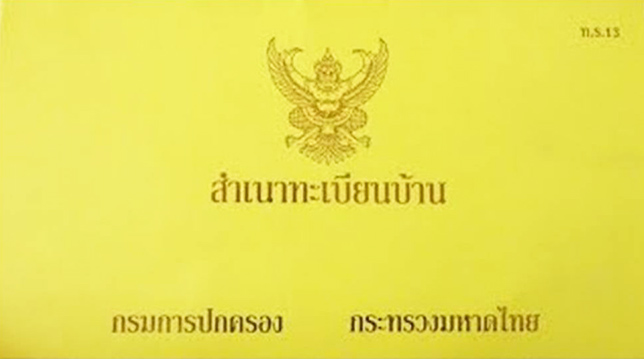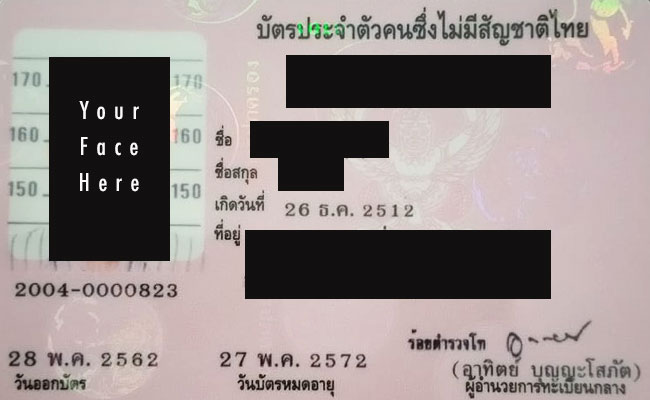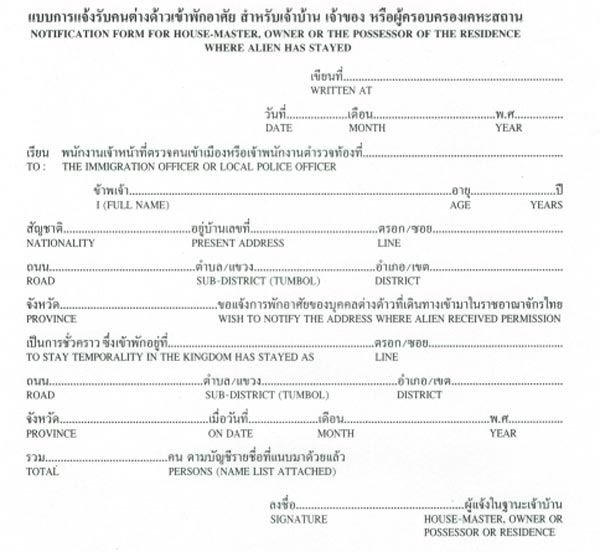A Tabien Baan is a house document, which translates literally as ‘House Registration' in Thai. The type of document relevant to foreign nationals is the yellow book Tabien Baan (ท.ร.13, Thor Ror 13).
This house registration book contains the details of all foreign nationals registered as living at the address (as their primary residence).
The Tabien Baan doesn't prove ownership of the property, only residence.
This yellow book differs from the standard blue book issued to Thai nationals (the ท.ร.14, Thor Ror 14). A foreigner can't be listed in a blue book, but you can apply for a yellow book to prove where you reside.
The Tabien Baan is used in Thailand for address verification, and is also a voter's roll used to identify those eligible to vote in elections.

Why Do Expats Need a Tabien Baan?
Not everyone does need one. In fact, many people live here for years and never need one. However, it reduces the paperwork when applying for a driving license or buying a car, because you won't need a residence certificate for proof of residence. Some types of bank account may require you to provide a Tabien Baan.
Depending on the requirements for the service you are dealing with, you may be able to avoid the need for a Tabien Baan by going to your embassy and getting a stamped letter to prove your residency. Doing this as a one off isn't a big deal, but doing so multiple times will become a hassle.
Getting your yellow house book is also the pathway to obtaining the Pink ID Card, which is an ID card for foreign nationals. More on that another time.
In summary, the benefit of the house registration book is hassle-free address verification.
What Details are Contained in the Tabien Baan?
The yellow book is written in Thai and contains details about the property. The first page contains the address and type of property (house or condo). Flip the page over and you'll see the name, nationality, date of birth and ID number of the house owner/master.
The proceeding pages of the book list the details of all other non-Thai residents residing at the property (that's you).
How Do I Get a Tabien Baan?
When you buy a property in Thailand, you are given a Tabien Baan as part of the property transfer process. However, by default this is usually a blue Tabien Baan and not the yellow one a foreigner requires. You can exchange this, though, at a local district office.
It's actually a good idea when buying a property to request the correct Tabien Baan prior to the transfer, so that you don't have to mess about with applying for one.
Outside of buying a property, you can apply for your yellow house registration book at a local amphur (district office).
As is par for the course, you may find slightly different requirements between district offices, but below are the standard requirements:
Required Documents
Please note that you will need a ‘house master' to approve your application to be listed at the property. This will be the owner of the house, or your landlord. If you live rurally, perhaps with your Thai partner, you may also need approval from the head of the village (the Phu Yai Baan).
Unless you're a long-term renter and have a good relationship with your landlord, don't be surprised if your landlord refuses your request for a Tabien Baan. Generally speaking, most expats with the yellow house book got it issued off the back of their partner's family home.
- A current passport (containing your visa entry stamp)*
- Two passport size photos
- Your work permit (if you have one)
- Your marriage certificate
- The ID card of your Thai spouse
- The house master's blue book (Tabien Baan). Or your lease agreement coupled with a copy of your landlord’s ID card and his/her Tabien Baan
- Two witnesses of Thai nationality and over the age of 20. They will need their ID cards with them.
You will need original copies and photocopies of your documents.
* My understanding is that the yellow Tabien Baan book is for expats on long stay visas (O, OA, OX, Elite, B, etc) and not for tourist visas or those entering on an exemption stamp. However, don't quote me on that as I'm sure someone will arrive in the comments and say they've gotten one on a tourist visa.
Processing Times
Again, this is office dependent, but most district offices can issue a Tabien Baan within an hour or so. You might have to come back the next day if they are really busy.
Rurally speaking, if you or your partner knows someone who works there, a small donation to the tea jar usually results in an expedited service.
Cost
The Tabien Baan is free, officially, but you may find that some district offices charge an administrative fee, or simply charge you because they can.
Generally speaking, if you go along with a Thai person you won't pay a dime. You may have to pay a fee to replace a lost or damaged book.
How Long do I Need to Have Lived at the Property?
It might seem a little strange, but you don't actually need to live at the property where you are registered. There is no time frame requirement either.
This is not unusual, though, not when you consider the millions of Thais who work away from the family home and return perhaps once a year for Songkran.
For address verification purposes, you might choose to register yourself at your wife's family home in Nakhon Nowhere but spend much of your time in Bangkok.
Have Your Say…
Got a question about getting a Tabien Baan? Have you already got one? And if so, has it been beneficial?
Share your questions, comments and experiences to help others get through the process as smoothly as possible.
Last Updated on



Sushil Sharma says
Aug 07, 2023 at 11:02 am
Jerry says
Brought the list back where i lease a room, the lady interpreted the items and thought the item marked ... copy of blue book to be added to ... meant i was going to be added to the owners blue book. I dont think that is correct, i thought it was to show who owned the property.
I have a Non O visa, an item on the list was a work permit. I know i can buy a condo without a work permit, my guess is he checked the items assuming i work, in BKK.
I want to know if anyone has got a yellow book without using the gf or spouses address, as a renter, or leasing a unit?
My gf is on the house she grew up in back in the province, its in her sisters name. How does that work? They add you to there blue book, or I get a yellow book using there blue book as proof of my address?
I think tge "added to the ownsrs blye book" phrase is what confused the lady here in the building. As a rental on a lease, I think, I get my own yellow book, that just references the blue book of the owner of the property at the address being used, I dont get added to his blue book.
Thanks in advance for helping me sort this out in my head so I can explain it to my Thai ... pals who will hopefully help me out.
Is there a BKK attorney or agent who might know the ropes to get this done?
Jun 26, 2023 at 4:58 pm
Char says
Have you got your Trebien Baan at Phra Khanong Office finally. I am preparing to apply the trebien baan but have problem now. As the condo was purchased under my husband and I, now I will apply trebien baan under my name. But my husband as one of the owner, he must do the same procedure to certify his passport. However, previously officer said my husband only needs to sign documents on the day I submit documents to district office. But today, she said my husband must show up on the day to collect the trebien baan, will be around one month time. May I know how long you can get the trebien baan after you submitted the requirment document please? My husband just getting a tourist visa, and must back to his country with one month time left in BKK.
Thank you.
Oct 01, 2024 at 5:44 pm
TheThailandLife says
Oct 01, 2024 at 6:28 pm
Steve says
Apr 04, 2023 at 3:36 pm
paul says
Mar 26, 2023 at 7:55 pm
JamesE says
My partner and I are unmarried and she "lives" at her sister's house even though we stay at her mom's house. My intent would be to get registered at her sister's address for consistency but exactly nobody in this familial equation wants anything to do with the M-word. Is my only choice buying a condo of my own for administrative purposes? Or does that still require marriage?
Mar 26, 2023 at 4:53 pm
Paul Hastilow says
You have crossed All the T’s…And Dotted the i’s
Cleared All the Hurdles they have thrown in front of you.
Basically , Passed the Test, well enough to be able to stay Here indefinitely, with regular visits to immigration.
A Compliant Farang, is a welcome Farang…
It make any further Legalities easier. You have a right of Abode, with your Name on it.
Oct 18, 2022 at 7:16 am
Albion says
Very well said - I look forward to being a compliant farang before too long…inshallah
A
Oct 19, 2022 at 7:40 pm
Andy says
Given an appointment for 6 September! Nine months from now
Not worth the hassle!
Jan 03, 2023 at 5:38 pm
TheThailandLife says
Jan 03, 2023 at 5:56 pm
Andy says
Many thanks
Jan 03, 2023 at 6:00 pm
AA says
Jan 03, 2023 at 8:07 pm
Andy says
Madness!
Jan 03, 2023 at 9:58 pm
Albion Ashes says
Oct 17, 2022 at 2:32 pm
Mike Baker says
Oct 17, 2022 at 5:55 pm
Albion Ashes says
Oct 17, 2022 at 6:51 pm
Mike Baker says
Oct 17, 2022 at 7:01 pm
James R says
Different people get different value from the documents. Maybe no benefit to you personally but other people use those documents for other reasons.
Nov 22, 2022 at 5:36 pm
R says
Nov 22, 2022 at 6:09 pm
Jerry says
Let me ask if I may. Since I need to do the same thing. I take a copy of my passport, and visa stamp page to my embassy (US), then they "stamp" the copies to make them official. Then take those now official copies to ? ... another office, where it is translated into Thai, "stamped" of course to become official. Then submit the official Thai version to the Ditrict office?
Is that correct? Do I need to get 2 offical copies?
Thanks in advance.
my gf says I dont have a job, i say its doing endless govt paperwork ... 555
Jun 26, 2023 at 5:24 pm
Martin says
Sep 01, 2022 at 3:20 pm
Gary Farmer says
Sep 01, 2022 at 4:39 pm
stephen says
he spoke excellent english and seemed to know his stuff..he said a farang cannot simply walk in and get a yellow book just because they are renting at the same place for a longtime!!
so what is correct here? i even showed him my retirement visa and the non -immigrant visa attached to it: the reply " cannot mister"
Jul 12, 2022 at 5:07 pm
Sam says
Jul 03, 2022 at 8:17 am
Gary Farmer says
Jul 04, 2022 at 10:24 am
Sam says
Jul 04, 2022 at 5:47 pm
James R says
Set an appointment, gave copies of passport, my Federal ID and marriage certificate, blue house book.. No income verification necessary. Received appointment 1 week following. Gave a “service fee” 1000 baht. (The clerk is MIL cousin) No real need for this, we just want expeditious service.
Day of appointment- back to the Amphur with my wife and 2 witnesses. One was my FIL and the other was the head of the mooban. We had a simple interview in Thai language, they seemed to be super impressed with my Thai which may have made things smoother, I can’t be sure.
We paid a small fee to the head of our village for his time (1000 bht) and we’re out of there within an hour.
I think it was a big deal for them (and it really was for me), people inside the office clapped, some shook my hand and a few said “you’re almost Thai now!” I’ve no reason to become a citizen, though.
Since that day, almost everyone in the mooban and even a few in Wichian Buri say hello and ask how my swimming pool is coming along. How they know about that, I have no idea…
Jul 05, 2022 at 2:15 pm
TheThailandLife says
Jul 05, 2022 at 4:42 pm
James R. says
Although my wife may have a different opinion when 20 people show up to swim.
Jul 05, 2022 at 8:22 pm
TheThailandLife says
Jul 05, 2022 at 9:05 pm